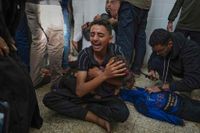The ongoing conflict in Gaza continues to escalate, with the Palestinian Ministry of Health reporting alarming figures of casualties and injuries. On May 6, 2025, the ministry disclosed that hospitals in the Gaza Strip received 48 martyrs, including 9 children, and treated 142 injuries over the previous 24 hours. This brings the total death toll since the onset of the Israeli aggression on October 7, 2023, to a staggering 52,615 martyrs and 118,752 injuries.
Since the resumption of hostilities on March 18, 2025, the situation has deteriorated further, with 2,507 martyrs and 6,711 injuries recorded in this latest phase of violence. The ministry's reports indicate that many victims remain trapped under rubble and in areas inaccessible to emergency responders, raising urgent concerns about the humanitarian crisis unfolding in the region.
In response to the escalating violence, the Israeli Defense Forces (IDF) announced their intent to intensify military operations in the southern Gaza area, particularly around Rafah. In a statement released on the same day, the IDF noted that they have completed the evacuation of Rafah and are continuing operations aimed at destroying underground infrastructure and combatting militant activity.
Israeli Prime Minister Benjamin Netanyahu, during a televised address, confirmed that a comprehensive military operation in Gaza had been approved by the cabinet, following recommendations from military leadership. He indicated that the military would be entering Rafah imminently, emphasizing the need for decisive action against what he referred to as threats in the region.
Avichay Adraee, an IDF spokesperson, characterized the ongoing military actions as a new phase of intensified attacks, dubbed "Rafah Gates." He claimed this operation would involve extensive military engagement aimed at displacing most residents of Gaza to areas deemed safe from Hamas, under the pretext of protecting civilians.
The humanitarian implications of this military escalation are severe. The Palestinian Ministry of Health has repeatedly warned that the depletion of fuel supplies necessary for hospital generators is imminent, which could disrupt medical services and exacerbate the already dire conditions faced by the injured and ill. The ministry has called for urgent assistance to ensure hospitals can continue to operate amidst the chaos.
As the conflict rages on, the international community watches with growing alarm. The humanitarian situation in Gaza has reached critical levels, with reports indicating that a significant portion of the population is suffering from lack of access to medical care, food, and clean water. The United Nations and various humanitarian organizations have called for a ceasefire to allow for the delivery of essential aid and to protect civilians caught in the crossfire.
In light of these developments, the plight of the Palestinian people continues to draw attention and concern from around the world. The statistics released by the Ministry of Health paint a grim picture of the ongoing violence and its toll on the civilian population, which is predominantly comprised of women and children.
As the situation evolves, many are left wondering how much longer the conflict will persist and what measures can be taken to bring about a resolution. The urgent need for humanitarian assistance and the protection of civilians remains at the forefront of discussions among international leaders and organizations.
In summary, the violence in Gaza has reached unprecedented levels, with casualties mounting daily. The reports from the Palestinian Ministry of Health underscore the urgent need for action to address the humanitarian crisis and protect the lives of those affected by the ongoing conflict. The international community must respond decisively to alleviate the suffering and work towards a sustainable peace in the region.




